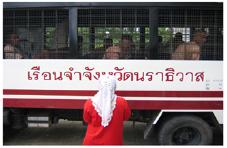A special investigation department for the deep South?
 Is it about time that a special department to deal exclusively with security-related cases which took place in the three southernmost provinces to be set up in order to improve the effectiveness of justice system there?
Is it about time that a special department to deal exclusively with security-related cases which took place in the three southernmost provinces to be set up in order to improve the effectiveness of justice system there?
This idea for the special investigating body similar to the Department of Special Investigation (DSI) was floated for discussions at a recent brain-storming session held by The Ministry of Justice. It was eventually endorsed as a matter of principle by the ministry.
The need for a department specializing in investigating security-related cases in the restive deep South stemmed from the fact that many of the violent incidents which occurred in the region did not make it to the court because many of the perpetrators were not arrested or even if they were arrested, many of them were acquitted.
Pol Col Thavee Sodsong, deputy permanent secretary of justice, said the most worrying aspect about the security-related cases which took place in the far South was that the DSI did not attach much interest in the cases as it had been in the past.
Experienced manpower and equipments were needed to deal with those cases because, in most of the cases, there were no eyewitnesses, said the police colonel.
Citing the the January 4, 2004 insurgent attack of an army armoury in Narathiwat in which more than 400 war weapons were stolen, Pol Col Thavee said the DSI was involved in the investigation from the start and managed to identify several suspected gun rubbers, including Sapae-ing Basor.
Now that the DSI is not so active in the deep South, it was recommended that a special investigating department should be established to investigate security-related casesm, said the police colonel.
The followings are an overview of the violent incidents which took place in the region in the past seven years. There were altogether 77,865 criminal cases of which 7,680 were security-related or 9.86 percent. Of the 7,689 security-related cases, offenders could not be identified in 5,872 cases leaving just 1,808 cases in which the alleged offenders could be identified or 23.54 percent. Of the 1,808 cases, alleged offenders were arrested in 1,264 cases.
There were altogether 77,865 criminal cases of which 7,680 were security-related or 9.86 percent. Of the 7,689 security-related cases, offenders could not be identified in 5,872 cases leaving just 1,808 cases in which the alleged offenders could be identified or 23.54 percent. Of the 1,808 cases, alleged offenders were arrested in 1,264 cases.
Of the 7,680 security-related cases, 1,536 cases made it to the court of justice with 210 of them acquitted. Of the 256 cases which were put on trial, 116 cases were acquitted and 140 cases convicted.
For the past seven years, there was only one case which went all the way up to the Supreme Court. The case was a motorcycle bomb explosion in front of Pitharn Panich car dealer’s shop in Muang district of Pattani on January 8, 2004. All the defendents were acquitted by the Supreme Court
The failure of the justice process was attributable to the following problems:
1. Most cases lack eyewitnesses. The cases were mostly based on confessions of the defendants made during the enquiry process.
2. 80 percent of the defendants were arrested after they were implicated or after they made confessions under interrogation.
3. Shortage of experienced enquiry officers to undertake interrogation.
4. Many suspects were locked up in jail for a long time, up to 1-2 years in some cases, before the trial of the cases started.
